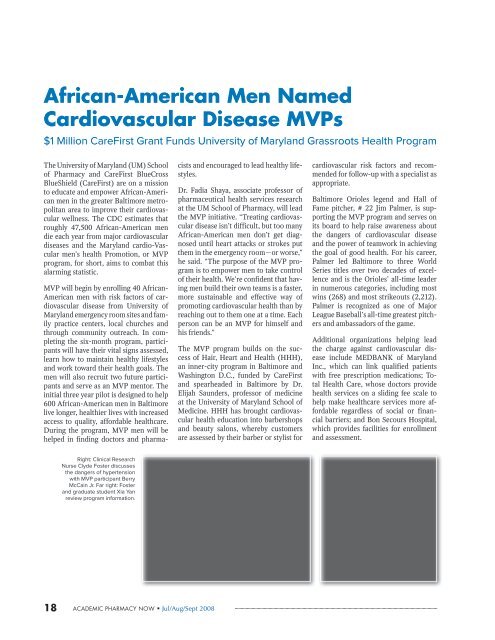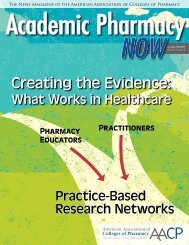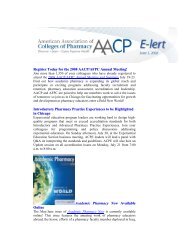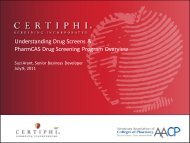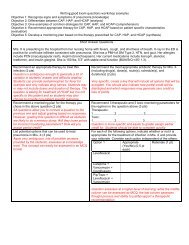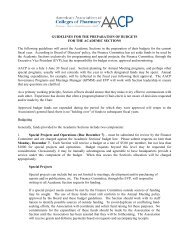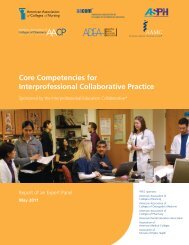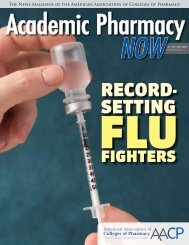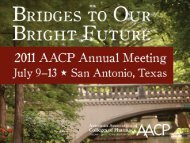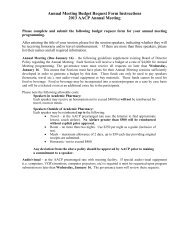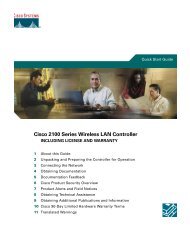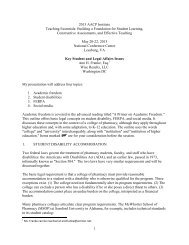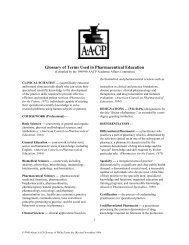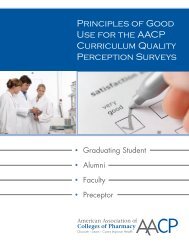Jul Aug 2008 APN.pdf - AACP
Jul Aug 2008 APN.pdf - AACP
Jul Aug 2008 APN.pdf - AACP
You also want an ePaper? Increase the reach of your titles
YUMPU automatically turns print PDFs into web optimized ePapers that Google loves.
African-American Men Named<br />
Cardiovascular Disease MVPs<br />
$1 Million CareFirst Grant Funds University of Maryland Grassroots Health Program<br />
The University of Maryland (UM) School<br />
of Pharmacy and CareFirst BlueCross<br />
BlueShield (CareFirst) are on a mission<br />
to educate and empower African-American<br />
men in the greater Baltimore metropolitan<br />
area to improve their cardiovascular<br />
wellness. The CDC estimates that<br />
roughly 47,500 African-American men<br />
die each year from major cardiovascular<br />
diseases and the Maryland cardio-Vascular<br />
men’s health Promotion, or MVP<br />
program, for short, aims to combat this<br />
alarming statistic.<br />
MVP will begin by enrolling 40 African-<br />
American men with risk factors of cardiovascular<br />
disease from University of<br />
Maryland emergency room sites and family<br />
practice centers, local churches and<br />
through community outreach. In completing<br />
the six-month program, participants<br />
will have their vital signs assessed,<br />
learn how to maintain healthy lifestyles<br />
and work toward their health goals. The<br />
men will also recruit two future participants<br />
and serve as an MVP mentor. The<br />
initial three year pilot is designed to help<br />
600 African-American men in Baltimore<br />
live longer, healthier lives with increased<br />
access to quality, affordable healthcare.<br />
During the program, MVP men will be<br />
helped in finding doctors and pharma-<br />
18<br />
Right: Clinical Research<br />
Nurse Clyde Foster discusses<br />
the dangers of hypertension<br />
with MVP participant Berry<br />
McCain Jr. Far right: Foster<br />
and graduate student Xia Yan<br />
review program information.<br />
academic Pharmacy now <strong>Jul</strong>/<strong>Aug</strong>/Sept <strong>2008</strong><br />
cists and encouraged to lead healthy lifestyles.<br />
Dr. Fadia Shaya, associate professor of<br />
pharmaceutical health services research<br />
at the UM School of Pharmacy, will lead<br />
the MVP initiative. “Treating cardiovascular<br />
disease isn’t difficult, but too many<br />
African-American men don’t get diagnosed<br />
until heart attacks or strokes put<br />
them in the emergency room—or worse,”<br />
he said. “The purpose of the MVP program<br />
is to empower men to take control<br />
of their health. We’re confident that having<br />
men build their own teams is a faster,<br />
more sustainable and effective way of<br />
promoting cardiovascular health than by<br />
reaching out to them one at a time. Each<br />
person can be an MVP for himself and<br />
his friends.”<br />
The MVP program builds on the success<br />
of Hair, Heart and Health (HHH),<br />
an inner-city program in Baltimore and<br />
Washington D.C., funded by CareFirst<br />
and spearheaded in Baltimore by Dr.<br />
Elijah Saunders, professor of medicine<br />
at the University of Maryland School of<br />
Medicine. HHH has brought cardiovascular<br />
health education into barbershops<br />
and beauty salons, whereby customers<br />
are assessed by their barber or stylist for<br />
cardiovascular risk factors and recommended<br />
for follow-up with a specialist as<br />
appropriate.<br />
Baltimore Orioles legend and Hall of<br />
Fame pitcher, # 22 Jim Palmer, is supporting<br />
the MVP program and serves on<br />
its board to help raise awareness about<br />
the dangers of cardiovascular disease<br />
and the power of teamwork in achieving<br />
the goal of good health. For his career,<br />
Palmer led Baltimore to three World<br />
Series titles over two decades of excellence<br />
and is the Orioles’ all-time leader<br />
in numerous categories, including most<br />
wins (268) and most strikeouts (2,212).<br />
Palmer is recognized as one of Major<br />
League Baseball’s all-time greatest pitchers<br />
and ambassadors of the game.<br />
Additional organizations helping lead<br />
the charge against cardiovascular disease<br />
include MEDBANK of Maryland<br />
Inc., which can link qualified patients<br />
with free prescription medications; Total<br />
Health Care, whose doctors provide<br />
health services on a sliding fee scale to<br />
help make healthcare services more affordable<br />
regardless of social or financial<br />
barriers; and Bon Secours Hospital,<br />
which provides facilities for enrollment<br />
and assessment.<br />
An Agent of Change<br />
<strong>AACP</strong> President Dr. Victor A. Yanchick foresees exciting but challenging times ahead<br />
At the <strong>2008</strong> <strong>AACP</strong>/<br />
AFPC Annual Meeting<br />
and Seminars, Dr.<br />
Victor A. Yanchick,<br />
dean of Virginia Commonwealth<br />
University<br />
School of Pharmacy,<br />
was installed as the<br />
<strong>2008</strong> <strong>AACP</strong> President.<br />
During his illustrious<br />
career, which has<br />
spanned more than four decades, Dr.<br />
Yanchick has served as dean at The University<br />
of Oklahoma College of Pharmacy<br />
and as a faculty member at The<br />
University of Texas at Austin College of<br />
Pharmacy. He completed his residency<br />
in hospital pharmacy at The University<br />
of Iowa. Academic Pharmacy Now was<br />
honored to talk with Dr. Yanchick about<br />
his exceptional career and his vision for<br />
the future of pharmacy education.<br />
<strong>APN</strong>: Over the past 40 years, you have<br />
seen the Academy change dramatically?<br />
Do you expect to see this explosive<br />
growth continue over the next 10 years?<br />
VY: I see the Academy changing, not<br />
just in membership but in the types of<br />
members in our colleges and schools of<br />
pharmacy. Of course, we will continue to<br />
have exceptional clinical faculty, but we<br />
are going to see people who are trained<br />
in many different ways, even those who<br />
are not educated in a pharmacy environment.<br />
Pharmacy is becoming much<br />
more global and much more diffuse in<br />
its application in areas such as genomics,<br />
proteomics, epidemiology, informatics<br />
and nanotechnology. I see bringing in<br />
faculty who have backgrounds in fields<br />
such as engineering, as well as others<br />
that we have never thought of as pharmacy<br />
educators, as a tremendous benefit<br />
to our students. I think that the entire<br />
structure of <strong>AACP</strong> could change in the<br />
next 10 years.<br />
<strong>APN</strong>: How great of a challenge do you<br />
think this will pose for Academy members?<br />
VY: I think it presents a significant challenge<br />
to us. We can never forget the cul-<br />
ture of pharmacy. We have a very rich<br />
and important history, a history that has<br />
to remain in the forefront, but I think<br />
that in order for us to know where we’re<br />
going, we need to know where we’ve<br />
been. I see this not only as a challenge,<br />
but an opportunity to broaden the training<br />
of our students.<br />
<strong>APN</strong>: Do you believe that the current<br />
systems in place for faculty development<br />
will remain the same, for example, the<br />
standard “tenure-track” vs. “non-tenure-track”?<br />
VY: No, I believe that the whole aspect of<br />
tenure should change in the future, and I<br />
think it WILL change in the future. I am<br />
not sure that we should expect someone<br />
to come into our colleges and schools<br />
and demonstrate within five years their<br />
usefulness for the next 30. I believe we<br />
really need to debate this long and hard.<br />
Unfortunately, we are not completely<br />
in control of tenure within our colleges<br />
and schools. For example, I think that<br />
if we plan to continue to use the tenure<br />
system to attract future faculty, my recommendation<br />
has been to consider not<br />
awarding tenure to a faculty member<br />
until they are promoted to full professor.<br />
This gives them enough time to determine<br />
their fit for the institution.<br />
<strong>APN</strong>: What would you like to see accomplished<br />
by the end of your presidency?<br />
VY: As I mentioned in my speech at the<br />
Annual Meeting, “Thinking Off the<br />
Map,” there are three major initiatives<br />
that I intend to pursue under this theme.<br />
They are:<br />
1. Globalization of Pharmacy Education;<br />
2. Faculty Recruitment and Retention,<br />
how do we better sell to our students<br />
the career of academic practice;<br />
and<br />
3. Curricular Reform, better preparing<br />
our pharmacy students to be prepared<br />
to handle the meteoric changes<br />
that we are seeing within healthcare<br />
delivery, medicine and within all of<br />
the healthcare industry.<br />
<strong>APN</strong>: You once shared with us that you<br />
were a rule-breaker when you began<br />
your practice. Can you share with our<br />
readers just how you broke the rules?<br />
VY: I remember when I was educated in<br />
pharmacy school, I was very unhappy<br />
about the way pharmacy was practiced.<br />
I worked in two community pharmacies<br />
part time and patients really relied<br />
on their pharmacist for information.<br />
Although the information was not as<br />
detailed and critical as the information<br />
we provide today, at least there was a<br />
patient dialog. Unfortunately, our code<br />
of ethics in the 60s when I graduated<br />
pharmacy school expressly prohibited<br />
pharmacists from talking with patients.<br />
We were to refer all questions that a patient<br />
might have back to their physicians.<br />
I thought that was fundamentally wrong,<br />
so I would talk to them. I would tell them<br />
the name of their drugs, and I would<br />
give them advice on how to use them. My<br />
wife was a nurse so she even taught me<br />
to take blood pressures for my patients. I<br />
remember being reprimanded by a physician<br />
for taking blood pressures, but it<br />
didn’t stop me.<br />
Of course, I don’t advocate breaking<br />
the rules, but back then I thought that<br />
we needed to change the way that pharmacists<br />
were viewed. In order to do this,<br />
we needed to change the way that we are<br />
educated. I really think that was one of<br />
the things that stuck in my mind and<br />
convinced me to go into education.<br />
Dr. Yanchick continues to change the<br />
way pharmacists are educated. From<br />
emerging techniques in medication therapy<br />
management to changes in the code<br />
of ethics that once prohibited pharmacists<br />
from communicating with patients,<br />
Dr. Yanchick has created and seen numerous<br />
changes in pharmacy education<br />
and practice. He is ready to lead <strong>AACP</strong><br />
as we navigate through the coming years<br />
of a changing world in healthcare and<br />
medicine.


